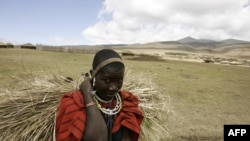Tanzanian authorities say violent clashes on June 10 between police and ethnic Maasai people they were trying to evict from a conservation area left one officer dead and scores of Maasai shot and wounded. While rights groups have condemned Tanzanian authorities for what they call unlawful evictions, some Maasai families say they had no choice but to move from their ancestral home to a reservation 600 kilometers away.
Saiboku Laizer, 63, has found a new home in eastern Tanzania’s Handeni township.
It’s about 600 kilometers south of his ancestral land in the Ngorongoro Conservation area.
Laizer has three wives and 20 children. In this new environment, he is worried about the fate of their long-preserved traditions, including living in a traditional Maasai bomas (huts).
Laizer said that in Ngorongoro, the laws were strict, and people were instructed about what to do with their land, so they had much time to invest in their traditions. But for now, he added, the traditions of living in bomas and living with many cattle may suffer.
He is among the Maasai who have left their land after a government eviction that has sparked protests and a violent police crackdown.
Government officials say the Maasai are being asked to voluntarily leave their homes, located in parts of the Ngorongoro Conservation Area.
They also say the goal of the eviction is to protect a conservation area from a growing Maasai population and their cattle.
But activists say they are being forced out to make way for trophy hunting and conservation zones. Onesmo Ole Ngurumwa, the executive director of Tanzania Human Rights Defenders Coalition, said they have been advising citizens to sit together with the government and write down their recommendations, and they have done that.
The challenge comes on the government’s side, he said. The government, he said, didn’t seem want or to pay attention to any recommendations. Instead, he said, it simply continued with the strategies it has already planned.
About 27 Maasai families already have shifted from Ngorongoro to Msomera village, where the government provides those evicted with a house and land where they can let their cattle graze.
Msomera Village chairperson Martin Oleikayo said the president’s plan to move Maasai from the Ngorongoro Conservation Area is for the benefit of all the country, adding that the revenue collected from tourism activities from the conservation area benefits all citizens.
Meanwhile, Laizer is adjusting to a new life and a new home. But he is worried about those more than 300 families that remain in the area, who are reluctant to leave the only home they have ever known.




